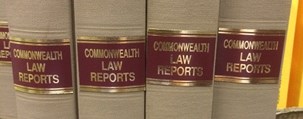Our new insolvency reforms … tired of waiting

I became tired of waiting for a government response to the commencement of the Insolvency Law Reform Act 2016 on 1 March 2017, and ….. zzzzzzzzzzzzzzzzzzzzzzzzzzzzzzzz.
Unpaid super, again; single touch payroll; penalties, and more

The Senate Economics References Committee is conducting another inquiry into the problem of the non-payment of superannuation by employers of their employees’ superannuation. To state the problem is to prompt a ready answer, that it should not be left up to the employer to pay the super, rather the super should be extracted at source […]
The decision in Sakr Nominees – keeping it in proportion

The NSW Court of Appeal has disposed of authority that sought to apply percentage based calculations to liquidators’ remuneration in particular cases. The Court has restored the orthodox position and confirmed existing principles on other aspects of remuneration: Sanderson as Liquidator of Sakr Nominees Pty Ltd (in liquidation) v Sakr [2017] NSWCA 38. These accord […]
Appeal decision in Sakr Nominees – remuneration of liquidators

A test case decision in Sakr Nominees from the NSW Court of Appeal will be given tomorrow 9 March at 10.15am EST. In my commentary on 12 January 2017, I said that the decision of Justice Black in PrimeSpace Property [2016] NSWSC 1821 (15 December 2016) might be seen as a worthy draft of the Court […]
ASIC’s regulation of unlawful phoenix activity – report 513

ASIC’s latest enforcement report – REP 513 ASIC enforcement outcomes: July to December 2016 – says up front that it has a focus on “rogue insolvency practitioners and others who facilitate serious illegal ‘phoenix’ behaviour and improper transactions in the face of insolvency”. Having opened with that, the report does not quite substantiate the existence […]
Australia’s first/worst insolvency reforms in many years – but she’ll be right….

Australia has implemented its first major insolvency reforms in many years but rather than being seen as an achievement they are regarded by many as being populist and over-regulatory. They have in fact been described by a senior insolvency academic as the worst insolvency reforms in his thirty year experience. The new law The Insolvency Law […]
Liquidators working overseas – how are they regulated? INSOL Academics 18-19 March 2017

I am pleased to be presenting at the INSOL Academics’ Group Colloquium in Sydney, being held on 18 and 19 March 2017. Its program is here. The colloquium is chaired by Professor Rosalind Mason, of Queensland University of Technology, QUT. My paper*asks: whether or how an Australian liquidator conducting investigations and proceedings overseas as a “foreign representative” under […]
Liquidators as the last in line – the Insolvency Law Bulletin

In an article entitled “Last Man Standing” in the Insolvency Law Bulletin, I have addressed the question of regulators tending to impose liability or responsibility on an insolvency appointee for past or further responsibilities of the insolvent company. As a court said, this can be an issue because after a corporate collapse, the liquidator is the […]
QUT Law – Current Issues in Insolvency Law: Global Perspectives – 24 March

The QUT Commercial and Property Law Research Centre is hosting international speakers and QUT academics at this session on Friday 24 March 2017, at QUT Brisbane. The seminar provides an opportunity to hear the latest developments in European cross-border insolvency and restructuring law, as well as important sessions on the regulation of the Australian profession, and on […]
Ian Fletcher International Insolvency Law Moot Competition: grand final Friday 17 March, 3pm-5pm, Sydney
Chief Justice James Allsop of Australia, Lord Justice David Richards of England and the former Justice the Hon Allan Gropper of the United States will preside over the grand finals in an international insolvency moot on 17 March 2017, after debating finals on 15 and 16 March. This ‘grand final’ session will be held in the […]
New insolvency laws now, with practitioners invited to implement some of the further new law before September

The first tranche of the changes effected by the Insolvency Law Reform Act 2016 commenced on 1 March 2017. The main changes address the two main drivers of this reform – ASIC v Ariff [2009] NSWSC 829, and the need for harmonization of the laws between corporate and personal insolvency. 1 March 2017 The new regimes for the registration, […]
New insolvency laws commencing 1 March – Q&A

This series of questions and answers address many of the issues with which practitioners and lawyers will be confronted in the new insolvency laws, commencing tomorrow, 1 March 2017. Most issues have already been explained in other entries on this site. Any comments, questions or corrections are welcome but nothing here constitutes legal advice on […]
UK insolvency practitioners can F…. their Forms

While insolvency practitioners in Australia are anxiously waiting to find out what new forms they must fill in and tick boxes to lodge with the regulators, UK practitioners will soon be able to Forget their Forms altogether. Existing insolvency forms are being withdrawn from 6 April 2017 when the new UK insolvency rules come into force. […]
White collar crime – what’s the point?
The Senate has granted a further extension to the white collar crime committee to report by 23 March 2017. It was originally going to report by early March 2017. This inquiry started in late 2015 and then lapsed with the general election. It has now had a further extension on its reporting. As reported in […]
“This does not inspire confidence” – the appointment of special purpose liquidators
Special purpose liquidators (SPLs) are becoming increasingly common. They are often appointed when a creditor prefers another liquidator to investigate certain matters, and when that creditor will only fund that liquidator. Conflicts of the appointed liquidator are another reason to appoint an SPL In this case, while making no adverse findings against the incumbent liquidators, […]
The most useful and well researched and argued law reform report for many years – Phoenix Activity: Regulating Fraudulent Use of the Corporate Form

The most useful and well researched and argued law reform report for many years has been issued on what to do about unlawful company phoenix activity. The research report – Phoenix Activity – Fraudulent Use of the Corporate Form – is that of the Melbourne Law School and Monash Business School, being their third and final. Their […]
Beneficial ownership of companies – consultation

The government has released a consultation paper on improving the transparency of information on the beneficial ownership and control of companies. Comments are due by 13 March 2017. This was foreshadowed in my earlier comments on 2 November 2016. As I said then, the idea of a beneficial ownership register for companies is not new, and […]
ASIC’s industry funding model – draft laws

Drafts of ASIC’s Supervisory Cost Recovery Levy Bill 2017 and related Bills have been released for comment, by 10 March 2017. Under these Bills, the levying of the costs of regulation of insolvency practitioners would now come under two different funding models, contrary to the new harmonized approach to insolvency, commencing next week, 1 March […]
Do you really want to renew your trustee registration under this new law?

It’s a matter for you but if you do, here is the application for renewal – form 31, from AFSA, an old fashioned print and fill out form. But it does not apply until 1 March 2017. From that date, a trustee may apply to have their registration renewed but before their registration ends. At […]
The Law in the Insolvency “Law” Reform Act 2016

The law has not been given much attention in the recent CLE and professional offerings on the new insolvency laws, with their limited focus on process and lodgements. The parts commencing imminently, on 1 March 2017, contain important but unexplained roles of various bodies in the regulation and discipline process. There may be significant administrative law concerns (a […]
The Culleton bankruptcy – part 4 of 4 – and the effect of a “stay”

The end of this saga came on 10 February 2017, when the Full Federal Court made orders amending para 2 of its 3 February orders to re-state that the appeal of Mr Culleton be dismissed and adding that Balwyn’s legal costs be paid out of Culleton’s bankrupt estate. Brief reasons for making the costs order […]
Egon Kisch and Albert Piddington

The name Egon Kisch may not be familiar to many but a recent talk given at an event held by the Australian Academy of Law reminded me of the name from my distant law school studies on civil liberties in Australian legal history. Kisch was a radical Czech journalist invited to address an anti-war rally […]
Insolvency reforms – what to expect in the first few weeks

This explains what insolvency practitioners, and lawyers, may immediately confront in the first weeks or so of the new law, under those new or amended sections of the Bankruptcy Act and the Corporations Act that apply from Wednesday 1 March 2017. Read on if you are interested, avoid if not. There are two tranches starting […]
Discipline process in insolvency — from 1 March 2017 – corporate

[a more detailed coverage] Replaces CALDB A discipline committee convened by ASIC under s 40-45 of the Corporations Schedule replaces the role of the CALDB. The new regime commences on 1 March 2017. The ILRA removes the role of the Board in relation to liquidators in favour of the ad hoc committee approach that presently […]

